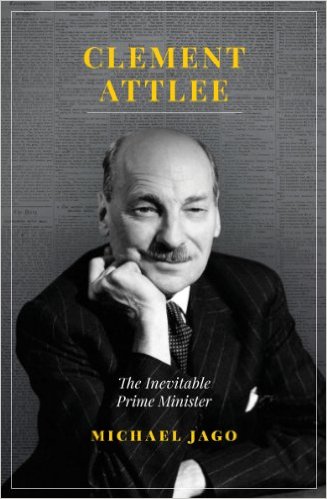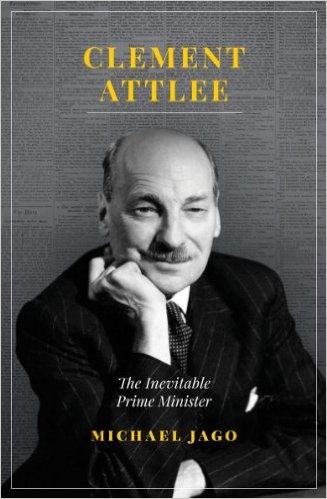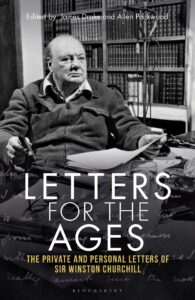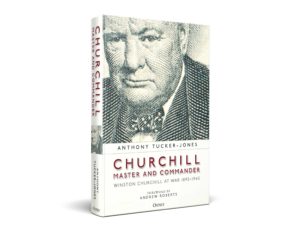Finest Hour 171
Books, Arts & Curiosities – The Lion of the Left

March 20, 2016
Finest Hour 171, Winter 2016
Page 46
Review by Mark Klobas
Michael Jago, Clement Attlee: The Inevitable Prime Minister, Biteback, 2014, 400 pages, £25.
ISBN 978-1849546836
 Much like Winston Churchill, Clement Attlee is a prime minister about whom many biographies are written. This output attests to his importance in British history for several reasons: as the longest-serving leader of the Labour Party; as the person whose refusal to serve in a coalition government with Neville Chamberlain helped bring Churchill to power; as the Deputy Prime Minister in Churchill’s wartime coalition; and as the head of the postwar Labour government that created a welfare state and nationalized several industries.
Much like Winston Churchill, Clement Attlee is a prime minister about whom many biographies are written. This output attests to his importance in British history for several reasons: as the longest-serving leader of the Labour Party; as the person whose refusal to serve in a coalition government with Neville Chamberlain helped bring Churchill to power; as the Deputy Prime Minister in Churchill’s wartime coalition; and as the head of the postwar Labour government that created a welfare state and nationalized several industries.
The life Michael Jago outlines differs little from previous biographies. He skims through Attlee’s upper-middle-class childhood in the London suburb of Putney, his education at Haileybury and Oxford, and his turn from a legal career to social work in the East End. Jago’s narrative then slows with Attlee’s entry into politics and focuses closely on his ascent to the leadership of the Labour Party in 1935. Jago argues that Attlee’s rise was far from the product of accidental circumstances, as has so often been claimed. Yet while the description of Attlee’s undoubted skills is convincing, it is hard to deny that the decimation of Labour’s parliamentary leadership in the 1931 general election helped clear the way for Attlee’s subsequent selection as party leader four years later.
Chamberlain’s resignation and Churchill’s selection in May 1940 opened the way for a coalition government and Attlee’s return to office. Jago’s analysis of the Attlee-Churchill relationship offers some of the most interesting pages in the book. Jago traces the beginnings not to 1940, but to Attlee’s participation in the ill-fated 1915 Gallipoli campaign. Unlike many others, Attlee agreed with Churchill’s view that the failure of the campaign lay not in its conception but in its execution, and during the Second World War Attlee never wavered from his view of Churchill as the indispensable leader. This trust was mutual, as Churchill frequently relied on Attlee to serve as his deputy (a designation made official in 1942) and trusted him with a variety of duties, all of which Attlee handled with an efficiency and effectiveness that impressed those with whom he worked.
Attlee’s position in the coalition required a difficult balancing act, however, since he also had to manage the opinion of a party worried that he was going down the same road travelled by Ramsay MacDonald in 1931. For Attlee, the challenge was to maintain his loyalty to Churchill as national leader while still remaining true to the party he led and preparing the ground for the general election that was due to follow the end of the war. Jago judges Attlee remarkably successful in this endeavor, which he sees as key to Labour’s subsequent success in the 1945 general election.
Attlee’s tenure as prime minister in the postwar Labour government takes up nearly half of the book, and understandably so given its importance both to Attlee’s career and to British history. Jago presents Attlee as a prime minister content to leave the details of governance to the members of his cabinet, who presided over a wholesale transformation of the role of the state in British life while overseeing the start of the Cold War and the British withdrawal from India and Palestine. The flaws in Attlee’s style began to show near the end of his government, though, as the achievement of goals led not to the establishment of new ones but the beginning of an ideological split within Labour, which Attlee was hard pressed to manage both in and out of office.
Jago’s book serves as a good overview of Attlee’s public career and the political context in which it took place. He has little that is new to say about his subject except for the chapter on Attlee’s relationship as premier with the intelligence services, one that reflects both the increased attention this aspect of government has received recently and the greater availability of sources in this secretive area. Thus Jago demonstrates how much we can still learn about the tenure of this remarkable politician, whose achievements and legacy remain worthy of our attention.
Subscribe
WANT MORE?
Get the Churchill Bulletin delivered to your inbox once a month.






